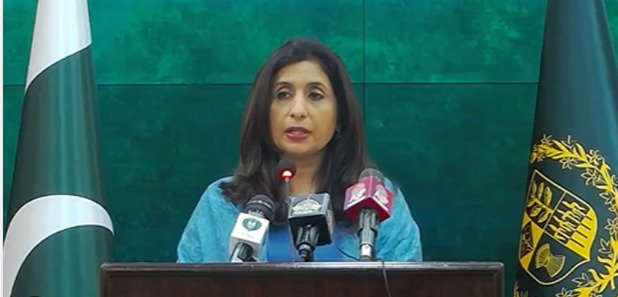- Web Desk
- Feb 19, 2026
Action against illegal residents not targeted at Afghan refugees: Pakistan
-

- Web Desk
- Oct 05, 2023

ISLAMABAD: Pakistan clarified on Thursday that its recent decision to deport illegal residents was not aimed at Afghan refugees but rather applied to all foreigners lacking valid visa documents.
During a weekly press briefing, Foreign Office Spokesperson Mumtaz Zahra Baloch asserted that the national policy toward Afghan refugees in the country “remained unchanged,” and their safe repatriation was a separate issue. She emphasized that the ongoing operation specifically targeted individuals who had either overstayed their visas or did not possess the necessary documents for legal residence.
Baloch further clarified that this operation had no bearing on the Afghan refugees that Pakistan had been hosting for several decades, despite its economic constraints. She confirmed the continued bilateral trade between Pakistan and Afghanistan but emphasized Pakistan’s stance against the misuse of transit trade facilities.
Regarding Afghanistan, Baloch stated that Pakistan had consistently voiced its concerns about potential threats emanating from the region and expressed its commitment to diplomatic engagement with Afghan authorities to prevent the use of Afghan soil for terrorism.
Baloch also highlighted Pakistan’s efforts to facilitate its citizens’ travel to India for the ICC (International Cricket Council) World Cup. She stressed that the host country’s responsibility was to provide security and a conducive environment for the Pakistan cricket team, emphasizing that sports should remain separate from politics.
Regarding international observers for the upcoming general election, Baloch mentioned that the Ministry of Foreign Affairs had received a formal communication from the Election Commission of Pakistan. She assured that the process would be conducted in accordance with established policy and past practices.
Pakistan should reconsider its decision on refugees eviction, Afghan Taliban
On the issue of Palestine, Baloch reaffirmed Pakistan’s support for a two-state solution based on pre-1967 borders.
Switching gears, the spokesperson outlined the engagements of Foreign Minister Jalil Abbas Jilani, who was currently in China upon a special invitation from Foreign Minister Wang Yi. They participated in the Third Trans-Himalaya Forum for International Cooperation in Tibet Autonomous Region. During his keynote address, FM Jilani emphasized Pakistan’s commitment to ecological balance and encouraged policy coordination and experience-sharing among regional countries.
FM Jilani and Chinese Foreign Minister Wang Yi held a bilateral meeting, where they discussed various aspects of Pakistan-China friendship and exchanged views on regional and global matters. Both ministers reaffirmed their commitment to the China-Pakistan Economic Corridor (CPEC) and pledged to enhance high-level exchanges and strategic communication for continued cooperation.
In Tibet, FM Jilani met Deputy Prime Minister of Mongolia, Sainbuyan Amarsaikha, and both sides reiterated their commitment to high-level exchanges and enhancing bilateral trade and investment.
Baloch also announced that Pakistan and the Gulf Cooperation Council (GCC) had successfully concluded negotiations on the Free Trade Agreement (FTA), marking the first such agreement with any country since 2009. She expressed optimism about the agreement’s early signing, ratification, and implementation, anticipating it would contribute to mutual growth and prosperity.
As the coordinator of the Organization of Islamic Cooperation (OIC) Group in Geneva, Pakistan co-organized an event with the OIC Observer Mission titled ‘Mapping the efficacy of normative framework on religious discrimination, intolerance, and hatred.’ The event aimed to raise awareness about religious discrimination and the need to strengthen the normative framework for addressing it from a human rights perspective.
Baloch concluded the briefing by condemning human rights violations in Indian Illegally Occupied Jammu and Kashmir (IIOJK). She cited incidents in September where Indian forces killed 13 Kashmiris in extra-judicial killings and arrested 157 civilians and activists, primarily under the draconian laws of the region—Public Safety Act (PSA) and Unlawful Activities (Prevention) Act (UAPA). She called for an end to such oppressive measures and violations and the release of Kashmiri leaders to allow the people of Kashmir to exercise their right to self-determination freely.




